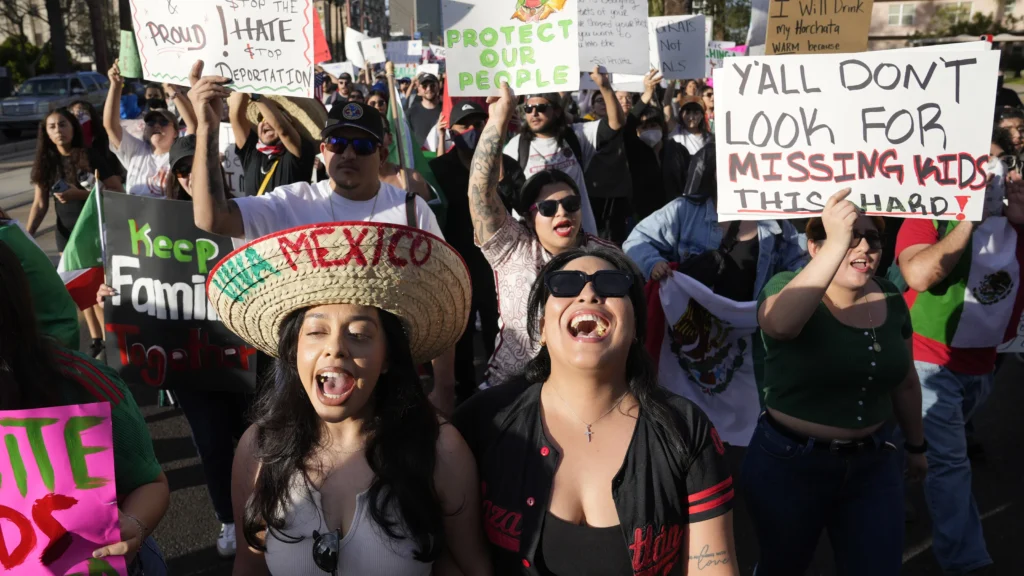Los Angeles witnessed a surge of protests on February 4, 2025, as thousands of demonstrators gathered to voice their opposition against recent migrant deportation policies enforced by the United States government. The demonstrations come amid heightened tensions over immigration enforcement and growing public concern over the treatment of migrants and asylum seekers at the federal and local levels.
Growing Public Outcry Over Deportation Measures
The protests were marked by passionate speeches, chants, and a diverse turnout including immigrant rights activists, community leaders, families of deported individuals, and local residents. The demonstrators called for an immediate halt to deportations and demanded reforms to immigration policies perceived as harsh and unjust.
“Families are being torn apart, and communities are living in fear,” said Maria Lopez, a spokesperson for the coalition organizing the protests. “This administration’s deportation policies not only break apart families but also undermine the values of justice and dignity.”
This wave of activism follows recent announcements by federal agencies increasing deportation raids in several states, including California. Advocates argue that these aggressive enforcement actions disproportionately target vulnerable populations, including asylum seekers and undocumented immigrants with longstanding community ties.
Federal Policies Under Scrutiny
The Biden administration, which had promised more humane immigration reforms during the 2024 election campaign, has faced criticism from both activists and some political allies for the pace and nature of deportations. Although the government maintains that deportation actions target individuals with serious criminal records, reports from immigrant rights groups indicate that many deported migrants had no violent histories and were often caught in broad enforcement sweeps.
An official statement from the Department of Homeland Security emphasized the necessity of upholding immigration laws while pledging to focus on “public safety threats.” However, this approach has done little to quell community concerns, particularly in cities like Los Angeles, where immigrants represent a significant portion of the population.
Impact on Local Communities
Los Angeles, with its long history as a sanctuary city, finds itself at the center of a national debate on immigration. Local officials have condemned the federal raids, stating they strain community trust in law enforcement and create an environment of fear that hampers cooperation with police and public services.
City Councilmember Ana Ramirez commented, “Our city thrives because of our immigrant communities. Policies that tear families apart are not only inhumane but also detrimental to the social fabric of Los Angeles.”
Community organizations have also stepped up support services, including legal aid and emergency assistance for families affected by deportations. Several immigrant advocacy groups have called on the city and state governments to strengthen protections and increase funding for immigrant rights programs.
Broader Context of Migration and Enforcement
The protests in Los Angeles reflect wider tensions across the United States regarding immigration policy, especially as the country faces challenges linked to migration flows from Central America, Asia, and other regions. Economic instability, climate change, and political unrest continue to drive people to seek refuge in the US, while the government grapples with balancing border security and humanitarian obligations.
Experts note that migration enforcement policies have often fluctuated with changes in administration, leading to uncertainty for migrants and their communities. Dr. Ellen Kim, a migration policy analyst, stated, “The ongoing deportation measures contribute to a cycle of fear and instability. Without comprehensive reform, these policies risk further marginalizing vulnerable populations.”
Calls for Policy Reform
Demonstrators and advocacy groups are urging lawmakers to enact comprehensive immigration reform that prioritizes pathways to citizenship, protections for asylum seekers, and limits on deportations that break up families.
As the debate continues, the situation in Los Angeles highlights the urgent need for a balanced approach that addresses security concerns while respecting human rights and community integrity.
This evolving story underscores the complex interplay between immigration enforcement and public response, as activists vow to continue advocating for change through peaceful protest and political engagement.
Disclaimer: This article is for informational purposes only and does not constitute financial advice.


















